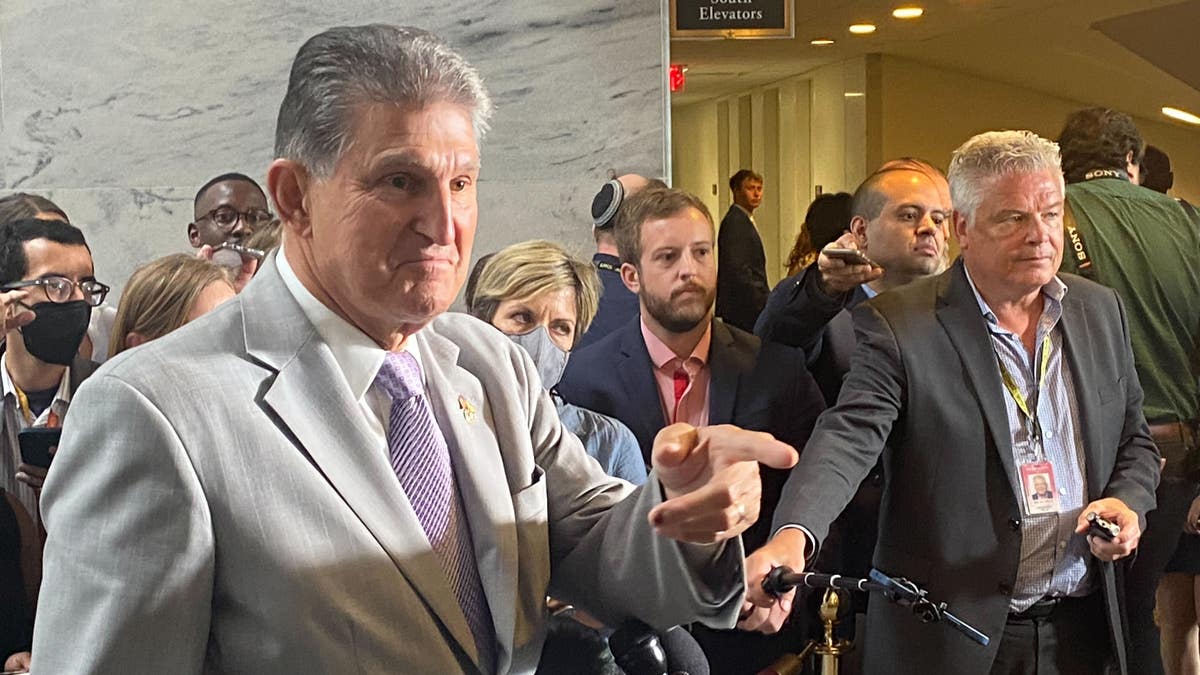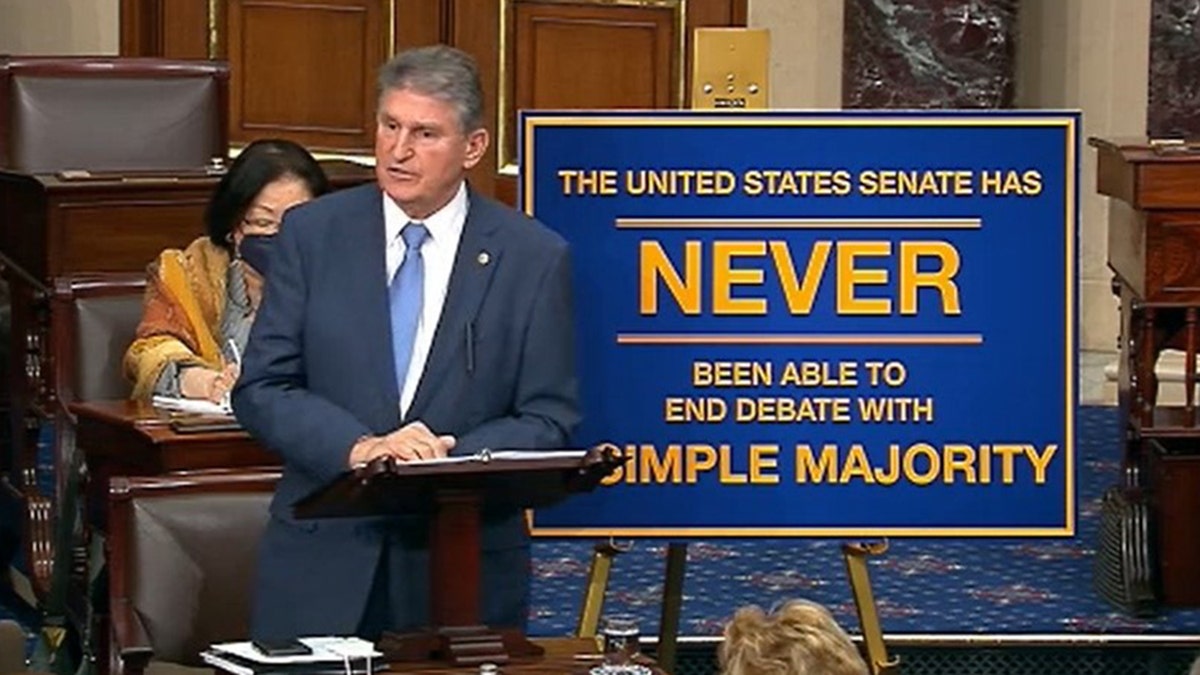Manchin's bill is a 'monstrosity': Newt Gingrich
Fox News contributor Newt Gingrich weighed in on President Biden's low approval ratings and discussed his chances of re-election on 'The Ingraham Angle.'
Sen. Joe Manchin has often frustrated Senate Democrats on key issues this Congress, and has a longstanding reputation as a moderate — but his overall voting record is closer to the party line than many other Senate centrists.
Manchin, D-W.Va., voted with Sen. Bernie Sanders, I-Vt., 88% of the time this Congress, and Sen. Elizabeth Warren, D-Mass., 91% of the time, according to a ProPublica database. Significantly, he also agreed with Senate Majority Leader Chuck Schumer, D-N.Y., on 91% of votes, according to ProPublica.
That number is lower than most other Democrats, including fellow moderate Sen. Kyrsten Sinema, D-Ariz., who voted with Schumer on 96% of roll calls since 2021. The bulk of other Senate Democrats vote with Schumer 98% of the time, according to ProPublica.
Manchin, however, toes the party line on votes much more often than some GOP moderates.

Sen. Joe Manchin, D-W.Va., calls on a reporter during a press conference about Democrats' reconciliation bill. (Tyler Olson/Fox News)
Sen. Susan Collins, R-Maine, cast just 62% of her votes with Minority Leader Mitch McConnell, R-Ky., this Congress, per ProPublica. Collins actually voted more with Schumer at 73% of the time, according to the database.
Sen. Lisa Murkowski, R-Alaska, votes with McConnell 68% of the time. Even Sen. Lindsey Graham, R-S.C., who in recent years has embraced former President Donald Trump and somewhat distanced himself from his moderate past, cast the same vote as McConnell only 73% of the time.
"The bottom line is he portrays himself as a moderate but at the end of the day he always ends up where Chuck Schumer needs him to be," a Senate GOP leadership aide said of Manchin.
In addition, Manchin backed and voted for Hillary Clinton in the 2016 presidential election.
A different Senate GOP aide noted one specific Manchin vote from this Congress that particularly irked them: The American Rescue Plan, which the aide said is the "$1.9 trillion bill that got us into this in the first place." That bill passed along party lines and would not have been law if Manchin voted against it. The GOP aide also noted that Manchin voted against Republicans' 2017 tax cut.
SCHUMER-MANCHIN SOCIAL SPENDING AND TAX BILL FACES MAJOR HURDLES AS DEMS SEEK QUICK PASSAGE
Renewed and forceful attacks on Manchin from Republicans come as he is leading the push for a new social spending and taxation bill that Democrats hope to pass along party lines, using a process called budget reconciliation. Schumer and Manchin announced the agreement, titled the "Inflation Reduction Act," last week after more than a year of intra-party talks.

Senate Majority Leader Chuck Schumer, D-N.Y., and Sen. Joe Manchin, D-W.Va., match on Senate votes 91% of the time — much more often than some moderate Republicans agree with Minority Leader Mitch McConnell. ((Photo by Lev Radin/Pacific Press/LightRocket via Getty Images))
The bill includes climate, prescription drug, Affordable Care Act, energy and tax provisions. It would spend $433 billion and would raise $739 billion in tax revenue, according to Democrats. Republicans, meanwhile, are attacking the bill for allegedly indirectly passing on tax burden to the middle class, according to the Joint Committee on Taxation, and what they say are frivolous climate provisions.
Manchin's office did not respond to a request for comment for this story. But the senator himself argues that Republicans are the ones who are off base, and that in less polarized times they would actually support his bill.
"My Republican colleagues are my friends and I've worked with them tremendously. And I will continue to work with them any way, shape or form," Manchin said earlier this week, in response to a question from Fox News Digital. "But these are things that we've all talked about in bipartisan groups. How can we start paying down our debt and… take our finances seriously, our financial house in order? These are things every time we get together as a group, bipartisan support, this is what we talk about. How can we get more production?"
Republicans also say that Manchin effectively flip-flopped, after saying as recently as last month that he didn't think it would be smart to pass a bill with major taxing and spending provisions in the current economy.
"Joe Manchin went back on everything he had been saying publicly about what he would not do," McConnell said Wednesday on Fox News Radio's "Guy Benson Show."

Sen. Joe Manchin, D-W.Va., is a significant part of the reason Democrats have not been able to get rid of the Senate's filibuster this Congress. (U.S. Senate/screenshot)
"It was a complete flip-flop. Everything he said he was against, now he's for," Sen. John Cornyn, R-Texas, said last week. "I regret it when people want to look you in the eye and lie to you. But that's a lesson learned, and it won't happen again."
The senior senator from West Virginia, of course, is not always in lockstep with his party. When Democrats were pushing an earlier version of their reconciliation bill, called "Build Back Better," Manchin shut down talks over his concerns about the proposed spending, which was as high as $3 trillion at some points.
He also has a history of reaming out Biden officials during hearings, particularly Federal Energy Regulatory Commission Chairman Richard Glick, who he lit into over allegedly slow-walking pipeline permits earlier this year. Manchin also voted to confirm Supreme Court Justices Neil Gorsuch and Brett Kavanaugh under former President Donald Trump.
CLICK HERE TO GET THE FOX NEWS APP
Perhaps most significantly, Manchin and Sinema stood in lockstep against Democrat efforts to eliminate the Senate filibuster altogether this Congress. Democrats tried to use the "nuclear option" to do that for an elections bill, and have said they want to get rid of the filibuster to pack the Supreme Court, make Puerto Rico a state, codify abortion rights and more. All of those efforts stalled, largely because of Manchin.
But after pushing for this social spending bill, Republicans say they no longer count Manchin as a moderate, and that they're done playing nice with him.
"We're going to be focused on that seat in 2024," Senate GOP Conference Chair John Barrasso, R-Wyo., said in a statement, referring to Manchin being up for re-election in 2024.















































